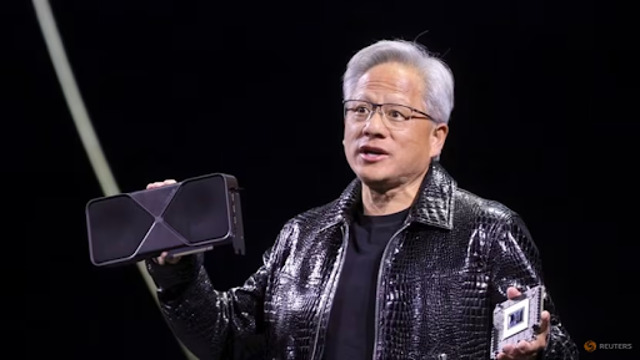
At CES 2025 in Las Vegas, Nvidia announced a new technology for training robots, introduced fresh gaming chips, and revealed a partnership with Toyota.
At the CES 2025 conference in Las Vegas, Nvidia introduced several groundbreaking technologies aimed at transforming the artificial intelligence (AI), gaming, and automotive industries. CEO Jensen Huang highlighted the company's latest advancements, including AI models for training robots and self-driving cars, enhanced gaming chips, and strategic partnerships with automotive giants.
AI Innovations for Robotics and Autonomous Vehicles
Nvidia unveiled the Cosmos Foundation models, a suite of AI tools designed to generate realistic videos for training robots and self-driving cars. These models create "synthetic" training data, enabling machines to learn about the physical world more cost-effectively than traditional methods, such as deploying vehicles to collect data or having humans teach robots repetitive tasks. By inputting a text description, users can generate videos depicting scenarios that adhere to the laws of physics, facilitating more efficient training processes. Huang expressed hope that Cosmos would have a transformative impact on robotics and industrial AI, similar to the influence of Meta's Llama 3 language models on enterprise AI.
Advancements in Gaming Technology
In the gaming sector, Nvidia introduced the RTX 50 series gaming chips, powered by the 'Blackwell' AI technology. These chips aim to deliver movie-like graphics, particularly enhancing 'shaders' to make images, such as a ceramic teapot, appear more realistic by adding imperfections and fingerprint smudges. Additionally, the chips assist game developers in creating more accurate human faces, addressing areas where players are sensitive to even slightly unrealistic features. The RTX 50 series will be available in models ranging from $549 to $1,999, with top-tier models launching on January 30 and lower-tier models in February.
Introduction of Project DIGITS Desktop Computer
Nvidia also introduced Project DIGITS, its first desktop computer tailored for programmers. Priced at $3,000, this machine operates on a Nvidia-developed operating system based on Linux and features a chip central to the company's data centre offerings. Designed for individual software developers, Project DIGITS enables rapid testing of AI systems. The desktop is scheduled for release in March.
Strategic Partnership with Toyota
In the automotive sector, Nvidia announced that Toyota Motor will integrate its Orin chips and automotive operating system into several vehicle models to enhance advanced driver assistance systems. While specific models were not disclosed, this partnership signifies a substantial expansion of Nvidia's presence in the automotive industry. Huang anticipates that automotive hardware and software revenue will reach $5 billion in fiscal 2026, up from an expected $4 billion this year.
Stock Performance and Market Valuation
Following these announcements, Nvidia's stock closed at a record high of $149.43, bringing its valuation to $3.66 trillion and making it the world's second-most valuable listed company, just behind Apple.
In summary, Nvidia's latest innovations and strategic partnerships underscore its commitment to advancing AI technologies across various sectors, including robotics, gaming, and automotive industries. The company's focus on cost-effective training methods, enhanced gaming experiences, and collaborations with major automotive manufacturers position it at the forefront of technological advancement.















